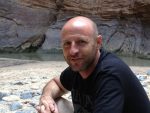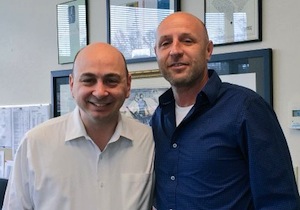Rami Katz (photo from Rami Katz)
Fish Soup, a 10-minute documentary by Vancouver-based filmmaker Rami Katz, screened at the Toronto Jewish Film Festival last month.
The film is an exploration of Katz’s family and their cultural traditions through the making of a fish soup. He has also submitted the documentary to the Vancouver Jewish Film Centre for consideration in its annual festival, which takes place in November.
“It was this program that motivated me to go on to film school at Simon Fraser University,” Katz told the Independent. “At the time, there were no documentary courses being offered, so my undergraduate film school experience was mostly in narrative filmmaking. But, in my third year, I interned for John Zaritsky, a veteran documentary filmmaker, and he ended up hiring me after I graduated. He has kept in touch as a friend and a mentor ever since, and has definitely been a huge inspiration to me.”
In addition to the industry itself, Katz has been influenced by professors, peers and his studies at the University of British Columbia.
“It has been an enriching experience to spend time with like-minded individuals who share similar passions for documentary film,” he said. “In 2014, I decided to go back to school to pursue an MFA in film production at UBC, which would allow me to grow and develop as a filmmaker, creatively and intellectually, and dedicate myself more fully to my own personal work. I made Fish Soup in a documentary class at UBC, taught by Cari Green and Bruce Spangler, both nurturing and supportive teachers.”
Fish Soup was developed after Katz told his partner, Sarah Sheridan, a humorous story about his father. After hearing the anecdote, Sheridan suggested that Katz make a film about it. He liked the idea of working on a personal project, as he had never before even considered making a documentary about his own life.
“I think everybody has a family recipe and everyone has a family story, so this film kind of taps into that and, hopefully, gets people thinking about their own stories they want to share. For me, this was also a way for me to connect to my own grandfather, whom I was named after but never got a chance to meet because he died before I was born.”
At the Toronto Jewish Film Festival screening of Fish Soup, Katz was able to include both Sheridan and his brother Raphael in the event. After the screening at the Royal Ontario Museum, Katz and his family were treated to a Shabbat dinner at the Free Times Café.
Though highly inclusive of both his family and his colleagues, Katz said creative control was paramount to successfully completing the documentary.
“I think, for a personal film, creative control is hugely important. It’s especially important if it’s a passion project, if you’re not getting paid to make it. It’s important to note here that my crew wasn’t getting paid as well, and they are putting in a lot of hours and energy and were hugely influential in the creation of the film. Sarah helped a lot with the initial concept and project logistics. She truly was a driving force behind the film and I couldn’t have made it without her help and support.”
Katz also expressed his gratitude to Ben Leyland, William Drobetsky and Felix Oltean.
When asked how Fish Soup touches on the importance of upholding familial traditions and values within the larger Jewish culture, Katz said, “I’m not very religious, but a lot of the cultural aspects of Judaism and some of the traditions are important for me. I like to celebrate the holidays and, for the past eight months or so, I’ve been observing Shabbat in my own way. Sarah and I recently hosted our first Passover seder, and we’re starting to do Shabbat dinners every now and then with friends. I think this film helped me to connect with my cultural roots and observe aspects of Judaism that are most meaningful to me.”
Katz is currently filming his master of fine arts thesis film at UBC – a documentary on the life and work of Vancouverite Jack O’Dell, 93, who was an influential figure within the African-American civil rights movement.
Jonathan Dick is a freelance writer living in Toronto. His writing has appeared in the Canadian Jewish News, and various other publications in Canada and the United States.





